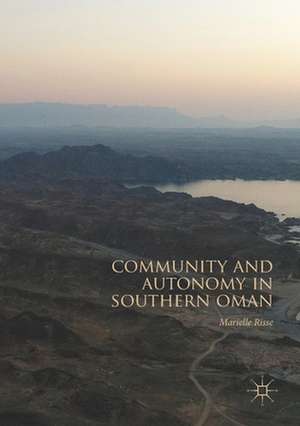Community and Autonomy in Southern Oman
Autor Marielle Risseen Limba Engleză Paperback – 14 aug 2020
| Toate formatele și edițiile | Preț | Express |
|---|---|---|
| Paperback (1) | 385.47 lei 6-8 săpt. | |
| Springer International Publishing – 14 aug 2020 | 385.47 lei 6-8 săpt. | |
| Hardback (1) | 506.93 lei 6-8 săpt. | |
| Springer International Publishing – 8 iul 2019 | 506.93 lei 6-8 săpt. |
Preț: 385.47 lei
Nou
Puncte Express: 578
Preț estimativ în valută:
73.78€ • 80.17$ • 62.02£
73.78€ • 80.17$ • 62.02£
Carte tipărită la comandă
Livrare economică 21 aprilie-05 mai
Preluare comenzi: 021 569.72.76
Specificații
ISBN-13: 9783030170066
ISBN-10: 3030170063
Pagini: 266
Ilustrații: XXVII, 266 p. 3 illus., 2 illus. in color.
Dimensiuni: 148 x 210 mm
Greutate: 0.35 kg
Ediția:1st ed. 2019
Editura: Springer International Publishing
Colecția Palgrave Macmillan
Locul publicării:Cham, Switzerland
ISBN-10: 3030170063
Pagini: 266
Ilustrații: XXVII, 266 p. 3 illus., 2 illus. in color.
Dimensiuni: 148 x 210 mm
Greutate: 0.35 kg
Ediția:1st ed. 2019
Editura: Springer International Publishing
Colecția Palgrave Macmillan
Locul publicării:Cham, Switzerland
Cuprins
Dedication.-Acknowledgements.-Preface.-Chapter 1: Language, Culture, Methodology and Literature Review.-Chapter 2: Situating Gibalis: Governance, History, Religion and Tribes.-Chapter 3: Community/Autonomy in Daily Life: People and Places.-Chapter 4: Community/Autonomy in Daily Life: Practices and Perceptions.-Chapter 5: Community/Autonomy: Honor and Self-Respect.-Chapter 6: "Why Would I Hurt a Woman?": The Absence of Honor Killing in Gibali Culture.-Chapter 7: Generosity and Gifts in Gibali Culture.-Coda.
Notă biografică
Marielle Risse, Ph.D., has lived and worked in Oman for over 12 years, teaching literature, culture and education at the university level. She has presented at the conferences of the British Society for Middle Eastern Studies, Middle Eastern Studies Association, Royal Geographical Society, British Foundation for the Study of Arabia, American Comparative Literature Association, and the Modern Language Association. Her work has been published in the Proceedings of the Seminar for Arabian Studies, Pedagogy, Journeys, Ariel, Interdisciplinary Humanities, The Chronicle of Higher Education, and The Washington Post.
Textul de pe ultima copertă
This book explores how there is latitude for people to make their own choices and how the chances to assert independence change over time in a Muslim, Arab, tribal culture. The book first gives a brief overview of day-to-day life in the Dhofar region of southern Oman, then focuses on how the traits of self-control and self-respect are linked in the everyday actions of several groups of tribes who speak Gibali (Jibbali, also known as Shari/Śḥeret), a non-written, Modern South Arabian language. Although no work can express the totality of a culture, this text describes how Gibalis are constantly shifting between preserving autonomy and signaling membership in family, tribal, and national communities. The work reflects observations and conclusions from over ten years of research into the history and culture of the Dhofar region along with longstanding, deep involvement with both men and women in the Gibali community.
Caracteristici
Provides a rare scholarly exploration of tribal, Muslim culture in the Dhofar region of Oman Rejects the idea of cultural determinism, investigating instead moments of individuality and choice in a tribal culture Articulates the complex relationship between autonomy and community in Gibali tribes
